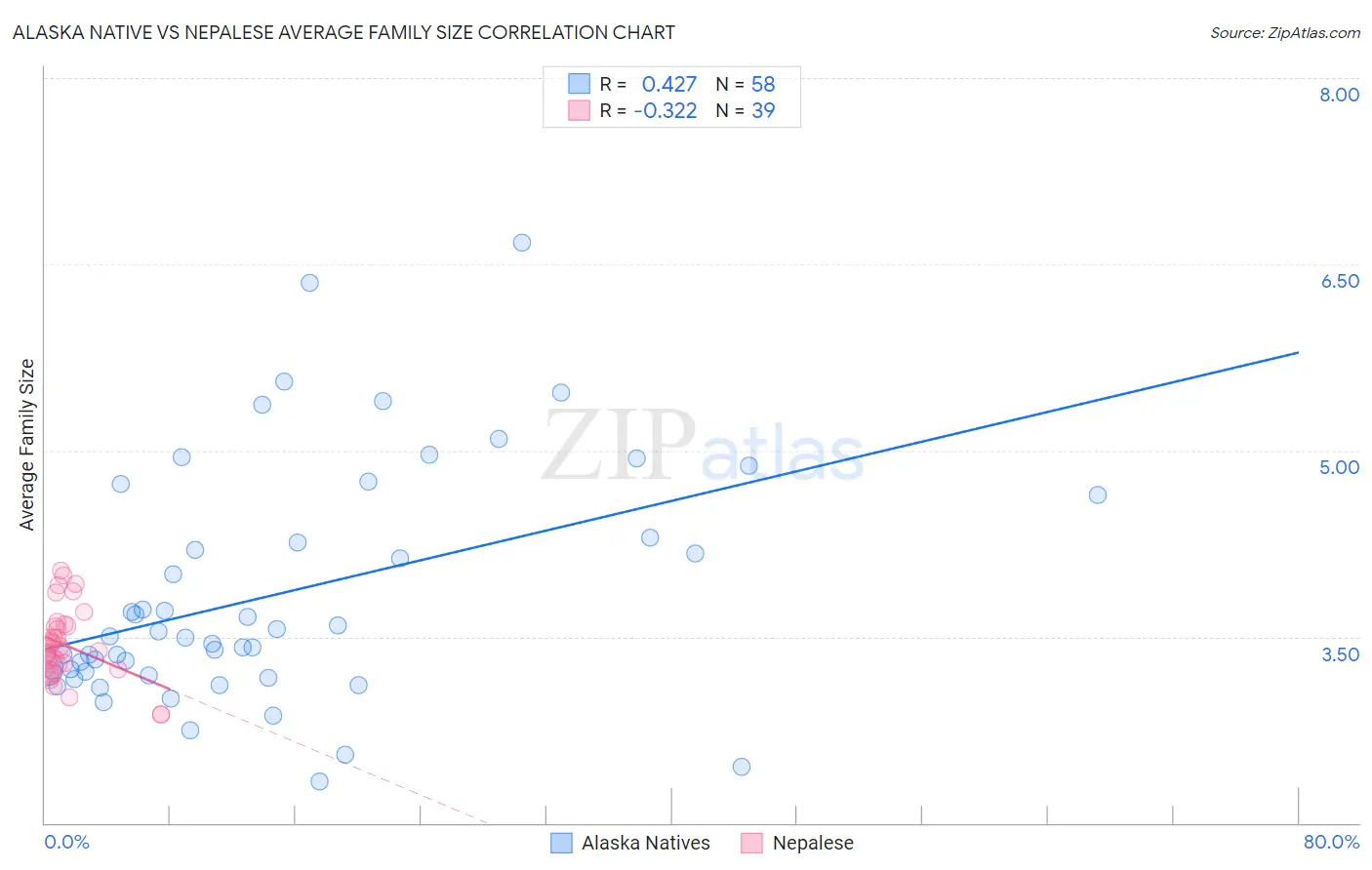Alaska Native vs Nepalese Average Family Size
COMPARE
Alaska Native
Nepalese
Average Family Size
Average Family Size Comparison
Alaska Natives
Nepalese
3.37
AVERAGE FAMILY SIZE
100.0/ 100
METRIC RATING
44th/ 347
METRIC RANK
3.42
AVERAGE FAMILY SIZE
100.0/ 100
METRIC RATING
29th/ 347
METRIC RANK
Alaska Native vs Nepalese Average Family Size Correlation Chart
The statistical analysis conducted on geographies consisting of 76,756,389 people shows a moderate positive correlation between the proportion of Alaska Natives and average family size in the United States with a correlation coefficient (R) of 0.427 and weighted average of 3.37. Similarly, the statistical analysis conducted on geographies consisting of 24,519,269 people shows a mild negative correlation between the proportion of Nepalese and average family size in the United States with a correlation coefficient (R) of -0.322 and weighted average of 3.42, a difference of 1.4%.

Average Family Size Correlation Summary
| Measurement | Alaska Native | Nepalese |
| Minimum | 2.33 | 2.87 |
| Maximum | 6.67 | 4.03 |
| Range | 4.34 | 1.16 |
| Mean | 3.83 | 3.43 |
| Median | 3.50 | 3.39 |
| Interquartile 25% (IQ1) | 3.22 | 3.24 |
| Interquartile 75% (IQ3) | 4.30 | 3.59 |
| Interquartile Range (IQR) | 1.08 | 0.34 |
| Standard Deviation (Sample) | 0.95 | 0.28 |
| Standard Deviation (Population) | 0.94 | 0.28 |
Demographics Similar to Alaska Natives and Nepalese by Average Family Size
In terms of average family size, the demographic groups most similar to Alaska Natives are Immigrants from Philippines (3.37, a difference of 0.010%), Shoshone (3.37, a difference of 0.030%), Haitian (3.37, a difference of 0.090%), Immigrants from Vietnam (3.38, a difference of 0.11%), and Marshallese (3.38, a difference of 0.17%). Similarly, the demographic groups most similar to Nepalese are Samoan (3.42, a difference of 0.030%), Immigrants from Latin America (3.42, a difference of 0.090%), Mexican American Indian (3.43, a difference of 0.21%), Native Hawaiian (3.43, a difference of 0.22%), and Central American (3.41, a difference of 0.23%).
| Demographics | Rating | Rank | Average Family Size |
| Native Hawaiians | 100.0 /100 | #26 | Exceptional 3.43 |
| Mexican American Indians | 100.0 /100 | #27 | Exceptional 3.43 |
| Immigrants | Latin America | 100.0 /100 | #28 | Exceptional 3.42 |
| Nepalese | 100.0 /100 | #29 | Exceptional 3.42 |
| Samoans | 100.0 /100 | #30 | Exceptional 3.42 |
| Central Americans | 100.0 /100 | #31 | Exceptional 3.41 |
| Immigrants | Guatemala | 100.0 /100 | #32 | Exceptional 3.41 |
| Hawaiians | 100.0 /100 | #33 | Exceptional 3.41 |
| Hispanics or Latinos | 100.0 /100 | #34 | Exceptional 3.41 |
| Guatemalans | 100.0 /100 | #35 | Exceptional 3.40 |
| Immigrants | Guyana | 100.0 /100 | #36 | Exceptional 3.40 |
| Guyanese | 100.0 /100 | #37 | Exceptional 3.40 |
| Immigrants | Belize | 100.0 /100 | #38 | Exceptional 3.39 |
| Immigrants | Haiti | 100.0 /100 | #39 | Exceptional 3.39 |
| Belizeans | 100.0 /100 | #40 | Exceptional 3.39 |
| Marshallese | 100.0 /100 | #41 | Exceptional 3.38 |
| Immigrants | Vietnam | 100.0 /100 | #42 | Exceptional 3.38 |
| Immigrants | Philippines | 100.0 /100 | #43 | Exceptional 3.37 |
| Alaska Natives | 100.0 /100 | #44 | Exceptional 3.37 |
| Shoshone | 100.0 /100 | #45 | Exceptional 3.37 |
| Haitians | 100.0 /100 | #46 | Exceptional 3.37 |